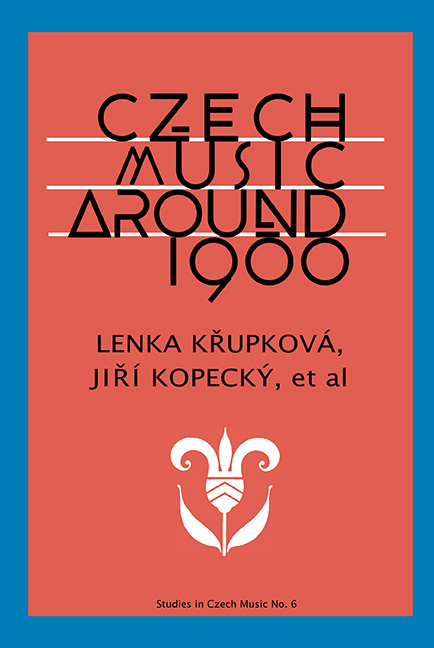Book contents
- Frontmatter
- Table of Contents
- Introductory Remarks on the Conception of This Book
- Flowers in the Graveyard, Tombstones in the Garden
- The “Other World” of Music at the Turn of the Century
- In the Footsteps of Tradition: The Spirit of Romanticism
- Czech Music at the Heart of European Music round 1900
- Novák as an Axial Figure in Czech Music
- Novák's Reception Abroad
- Josef Suk, Dvořák's Favorite Pupil
- Fibich's Path to Success in Prague's National Theater
- Tchaikovsky, Charpentier and the Formation of Janáček's Mature Operatic Style
- Josef Bohuslav Foerster's Lyrical Opera Eva and the Tradition of the French Drama lyrique
- Otakar Ostrčil and Mahler's Influence in Prague
- Folk Culture as an Outward Source of Artistic Inspiration: Vítězslav Novák the Tourist
- The Clash with Compositional Issues of European Music
- Index
- List of Illustrations
- About the Authors
- List of Sources Cited
Novák as an Axial Figure in Czech Music
from Czech Music at the Heart of European Music round 1900
- Frontmatter
- Table of Contents
- Introductory Remarks on the Conception of This Book
- Flowers in the Graveyard, Tombstones in the Garden
- The “Other World” of Music at the Turn of the Century
- In the Footsteps of Tradition: The Spirit of Romanticism
- Czech Music at the Heart of European Music round 1900
- Novák as an Axial Figure in Czech Music
- Novák's Reception Abroad
- Josef Suk, Dvořák's Favorite Pupil
- Fibich's Path to Success in Prague's National Theater
- Tchaikovsky, Charpentier and the Formation of Janáček's Mature Operatic Style
- Josef Bohuslav Foerster's Lyrical Opera Eva and the Tradition of the French Drama lyrique
- Otakar Ostrčil and Mahler's Influence in Prague
- Folk Culture as an Outward Source of Artistic Inspiration: Vítězslav Novák the Tourist
- The Clash with Compositional Issues of European Music
- Index
- List of Illustrations
- About the Authors
- List of Sources Cited
Summary
Early in the 1880s, thus during the final years of the life of Bedřich Smetana, the Czech aesthetician Otakar Hostinský (1847-1910) sketched a conception of the further development of Czech modern music, reacting to widespread fears about the further fates of Czech music after the death of its founders and attempting to prevent its possible regression. He based his thoughts on the idea that continuous musical progress was indispensable:
We've covered a lot of ground—but before us lies a further path that is totally unforeseeable and without direction because, although our steps have a noble goal giving them direction as a star guides a mariner, they don't have such a goal as would stipulate the end of the journey and lasting rest.
Composers of the upcoming generation seemed to be the ideal representatives of such progress. In November 1893 early works of Josef Suk and Vítězslav Novák sounded in a concert of the Artists’ Society that was later declared “a memorable and important milestone in the history of Czech music,” and these two young composers became the official leading figures in Czech modern music. Their position as the main representatives of the ideal trend in the development of Czech music was somewhat shaken by the polemical conception of Zdeněk Nejedlý, who in his Dějiny českéhudby (The History of Czech Music), published in 1903, divided music after Smetana into two currents. For him the first, “progressive” current was represented by composers who followed most closely in the footsteps of Smetana; among them he gave first place to Zdeněk Fibich, Josef Boleslav Foerster, and later Otakar Ostrčil. The second, “conservative” current was represented by successors to Dvořák, thus above all his pupils Novák and Suk. Later Nejedlý's negative verdict also fell upon Leoš Janáček, whom he condemned as a “naturalist.” The confrontation between the “Smetanian” camp of Nejedlý and his supporters, whose forum became mainly the journal Smetana, and the “Dvořákians” grouped mainly around the journal Hudebnírevue (The Music Review), climaxed late in 1912 with the “battle over Dvořák.” These polemics, rather destructive to Czech musical culture, were interrupted by the world war and afterward by the rise of new stylistic trends in European culture which affected Czech music with full force and led to a certain regrouping of positions among Czech composers.
- Type
- Chapter
- Information
- Czech Music around 1900 , pp. 107 - 112Publisher: Boydell & BrewerPrint publication year: 2017

